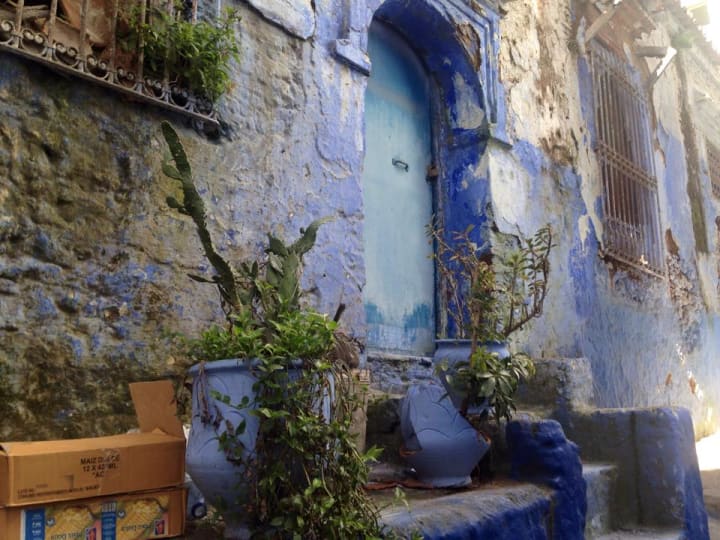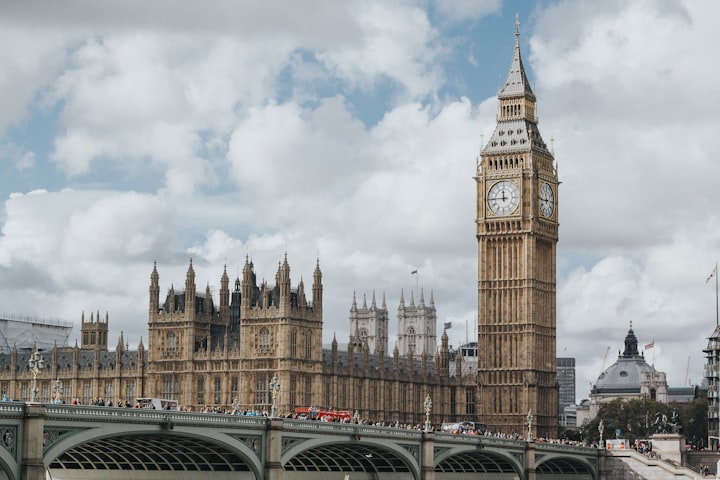For the Love of Tagine
A glimpse into Morocco from its past, present and all-time lovers.

Welcome to the blue city. There is a four-year-old child clinging to his cat on the steps of his home. The blue tunnels feel like underwater caves and you almost expect sharks and dolphins to weave between the crowds. There is an old lady selling bread- hard, floury, fresh Moroccan khobz, and a flock of animals and their child counterparts run up and try to steal crumby mouthfuls. The smell of leather, incense and cinnamon loom from musty underground doorways. Handmade jewellery and hair oils line doorways and wooden shops and the pavement is cool and dusty. Doesn’t this sound glorious? This is Chefchaouen, in the far dreamy north of Morocco.
For decades, Morocco has been the perfect getaway for the world since its humble rise to tourism glory. With the flourishing economy of the Dirham, everything is cheap, beautiful and authentic. The proximity to Europe sees millions of people travel there each year, but somehow there is still a dark stigma attached to this paradise. Accounts of violent protesting, pickpocketing and the swift rise of the Islamic State has somehow created a monster out of the peaceful country known best for its warmth. The Northern African country is seen to be sour to women in particular as there is a history of poor women’s rights. In fact, a British newspaper has just named Morocco to be the un-friendliest holiday destination of 2015, but it seems the vast majority of people to agree with that are those who haven’t experienced the famed hospitality in person. Here are the love stories of three people who have fallen for the Kingdom of the Arab West, and why you should too.
The backpacker who got stuck like glue
Chefchaouen is the favourite city of 18-year-old Australian backpacker Chloe who fell head over heels in love with Morocco and accidentally stayed for six weeks. Chloe says that during her time there, she felt as though she belonged.
“I was talking to some locals about how they felt about me (being a Westerner) and everybody said I had a right to be who I was. An old man even said to me that we all have the same roots, we just come from different branches,” says Chloe.
Before she left for Morocco, she didn’t know too much about it. “I’d heard it was a bit scary- I heard you should never go without a tour group.”
This is where the stigma lies. Women especially are told to never dream of travelling to Morocco alone. Nobody bats an eyelash when they travel to the USA alone, where you are statistically more likely to be killed by a gun than in a car crash. How ridiculous.
Taking that advice though, Chloe did initially go with a tour group. She ended up feeling so safe that she left the group five days early and ended up extending her stay by five weeks.
She eventually travelled the east coast of the country, stopping in the desert, and eventually made her way to a small beach city called Essaouria (pronounced Essa-weera), known for its French vibes, surf and fresh seafood.
When the time came for Chloe to leave, she packed her things reluctantly and told her new friends she would return to live there eventually.
To Chloe, the people were the best part of the experience. She couch surfed three times during her time in Morocco and says that she found the people far more open than anywhere else she had travelled.
Bad people are found everywhere, and you will get them in Morocco too. Their religion and lifestyles are built on kindness and that is the main vibe you get when walking around the crazy streets.
“In other countries they were friendly but distant- less likely to invite a random traveller into their home,” she says.
“The people were just so hospitable, kind, welcome and accepting.”
The philosophy of one nation, one family is also strong in Morocco. Due to the devout Muslim beliefs, there was a lack of crime and mistrust within communities.
Children as young as four run around the medinas with their friends until dusk. People leave their doors wide-open and welcome unexpected visitors. Chloe says that this is normal there. “Everybody treats the children as if they were their own; it’s like the country is one big family.”
The thing about Morocco is the mystery. It is the absolute absurdity of the place. It’s the chaos without feeling like you’re in a rush. There is hustle bustle, but the world stands still.
“It felt like I had gone back in time,” Chloe says. “Seeing how differently people lived just an hour ferry ride away was amazing.”
“I love that it is untainted by the ugly Western World. I love it.”
The girl who was adopted by the city of chaos
There’s a 20 year old Polish girl sitting somewhere on a rooftop in Casablanca. She has been an expat in the city of contrasts for two and a half years now, and has no plan to leave.
“I’ve always been a wanderer. My parents said that when I was six, I told them I would marry a Peruvian and live in India,” she says.
Monika says that she loves Casablanca, flaws and all. A lot of her friends ask her how it’s possible to love such an untamed, disorganised city, but she is smitten.
“I love Casablanca for its opportunities and the amazing people. At first sight it’s not beautiful, but if you dig deeper you’ll see its hidden beauty.”
It’s just like that here. The news reports the bad and the ugly, just like it does here in Australia. The only difference is Morocco is not westernised, so it automatically leaves a bad taste in the mouths of those who are easily influenced.
The Australian government has recently upped the security to high in Morocco. This seems scary, but Bali has been on a high security alert since 2001 and we all flock there in our most vulnerable, bikini-clad state.
To Monika this is ridiculous. The hardest part of transitioning into the Moroccan culture she says was getting used to the inshalah syndrome , or a disorganised lifestyle.
“It’s mostly the official side that is crazy. Every person tells you a different way to do things.”
In a sea of colours and landscapes, Monika says that the most special thing about the country is the diversity. She is constantly invited to weddings of people she doesn’t know and magnificent holidays in the desert or to the sea.
“They’re such curious and warm people. They want to know you and spend time with you.”
She talks about sticking out like a sore thumb because of her pale skin and blonde hair. She says that she can’t count the number of times she has jumped the queue because the locals want to help this mysterious ‘stranger’.
“I didn’t even have to stay in queue to legalise my residency!” she says.
One of the most exciting things in Monika’s calendar is Friday Couscous night. Coined by the locals, Monika is often invited round to a colourful feast of couscous with the brightest and freshest produce. They belly dance and sit on the floor to eat.
She says the Moroccan way of life is simple and beautiful. The day is always full of contradictions and surprises. “To me, it’s just the most beautiful place on earth.”
The boy who wants to spread the word
Meet Ilias. He is Moroccan. To him, being Moroccan is not a heritage; it’s a way of life. His roots define his life and everything he does. Currently living in Lille, France, Ilias says that the hardest part about being away from home is the warm people and the warm aromas of tagine.
“Life in France is good but very different. I don’t feel as welcomed here. They are not all one big family like we are at home.”
Like most of us do, Ilias left home to pursue something different. He left to experience life outside of his comfort zone. Did you read that? Morocco is a comfort zone.
When asked what he would say to someone skeptical of visiting his country, he says he is shocked anyone would think twice. “You’ve got to come check it out. We are a great country and we love visitors.”
“Many people I have met here (in France) are from places like Brazil or Mexico and they say they are scared to walk around alone at home. No Moroccan is scared to walk around their own country,” he says.
Ilias says the whole country, desert and all, is like a backyard to him and his friends. He grew up eating dinner on the steps of his mother’s house, surrounded by twenty of his closest friends and family members.
The city of Marrakesh is the city that Ilias calls home. It is bright and edgy and exotic and often feels like one huge carnival. He is unaffected here- completely at a peaceful stand still. He jumps at the opportunity to return home to visit.
“It’s not just my home,” he says. “It is a home for everybody.”






Comments
There are no comments for this story
Be the first to respond and start the conversation.